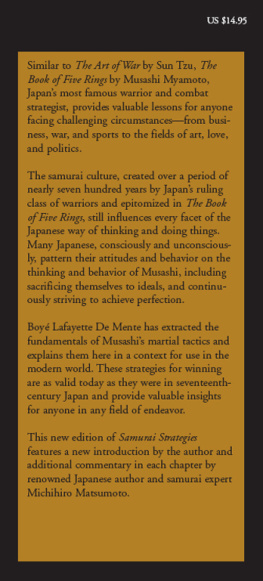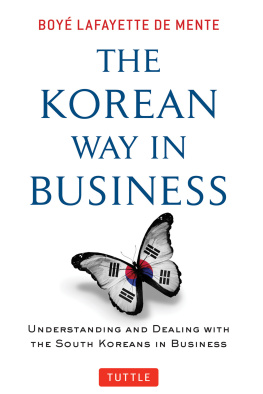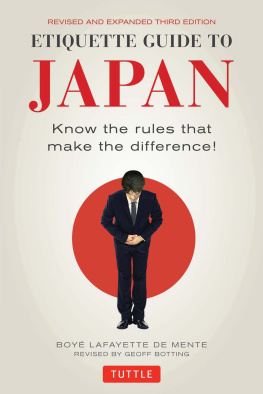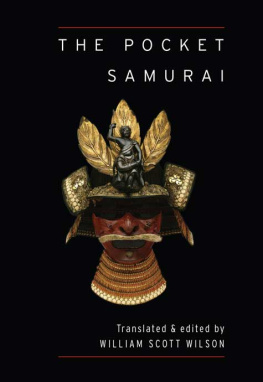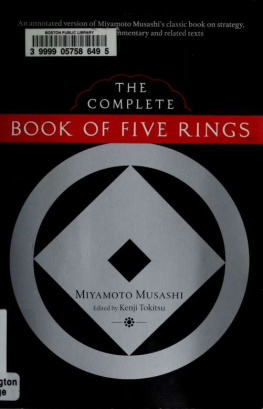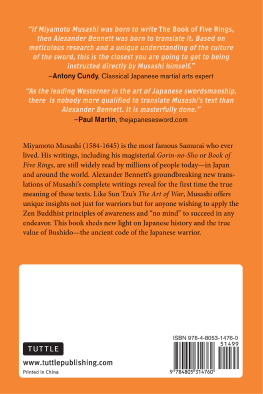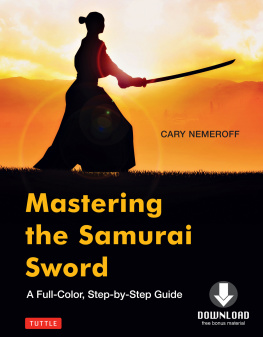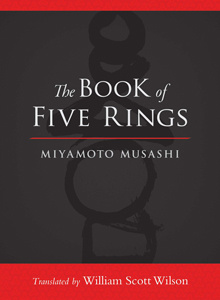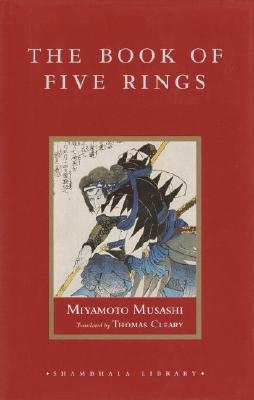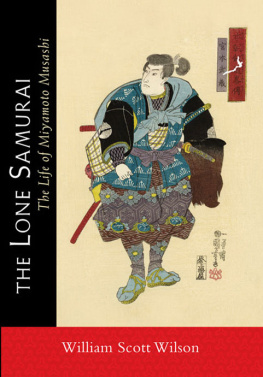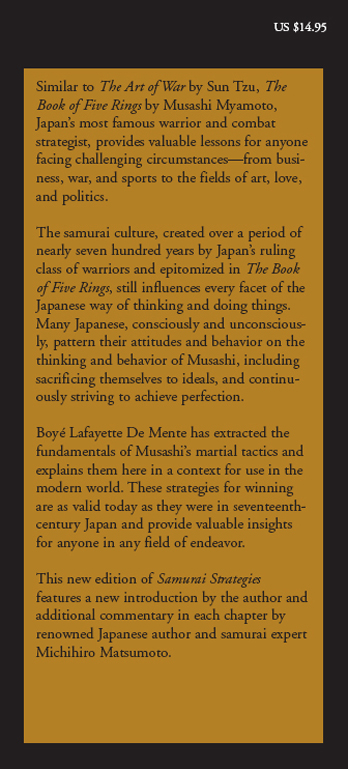Other Books by the Author
(Partial Listing)
Japanese Etiquette and Ethics in Business
Korean Business Etiquette
Businessmans Quick-Guide to Japan New Title
Survival Japanese
Etiquette Guide to Japan
Instant Japanese
Japans Cultural Code Words
Chinas Cultural Code Words
Mexican Cultural Code Words
Cultural Code Words of the Hopi People
Cultural Code Words of the Navajo People
ONCE A FOOLFrom Japan to Alaska by Amphibious Jeep
Which Side of Your Brain Am I Talking To?
The Advantages of Using Both Sides of Your Brain
Romantic MexicoThe Image & The Realities
KATA: The Key to Understanding and Dealing with the Japanese
Asian Face ReadingUnlocking the Secrets Hidden in the Human Face
The Japanese Samurai Code:Classic Strategies for Success
Instant Chinese
Survival Chinese
Instant Korean
Survival Korean
Japan Unmasked
ACKNOWLEDGMENT
I am indebted to my publisher Eric Oey for suggesting this book, and to my editor Ed Walters for making the text far more readable and useful to anyone wanting to achieve success in todays world.
Published by Tuttle Publishing, an imprint of Periplus Editions (HK) Ltd, with editorial offices at 364 Innovation Drive, North Clarendon, Vermont 05759, U.S.A. and 61 Tai Seng Avenue #02-12, Singapore 534167.
Copyright 2008 Boy Lafayette De Mente
All rights reserved. No part of this publication may be reproduced or utilized in any form or by any means, electronic, mechanical, including photocopying, recording or by any information storage retrieval system, without prior permission of the publisher.
Library of Congress Control Number: 2008925549
ISBN 978-0-8048-3950-1
Distributed by:
| North America, Latin America & | Asia Pacific |
| Europe | Berkeley Books Pte. Ltd. |
| Tuttle Publishing | 61 Tai Seng Avenue, #02-12 |
| 364 Innovation Drive | Singapore 534167 |
| North Clarendon, VT 05759-9436 U.S.A. | Tel: (65) 6280 1330 |
| Tel: 1 (802) 773 8930 | Fax: (65) 6280 6290 |
| Fax: 1 (802) 773 6993 | Email: inquiries@periplus.com.sg |
| Email: info@tuttlepublishing.com | www.periplus.com |
| www.tuttlepublishing.com |
Japan
Tuttle Publishing
Yaekari Building, 3rd Floor
5-4-12 Osaki, Shinagawa-ku
Tokyo 141-0032
Tel: (03) 5437 0171
Fax: (03) 5437 0755
Email: tuttle-sales@gol.com
Printed in the United States of America
12 11 10 09 6 5 4 3 2
TUTTLE PUBLISHING is a registered trademark of Tuttle Publishing, a division of Periplus Editions (HK) Ltd.
SAMURAI
STRATEGIES
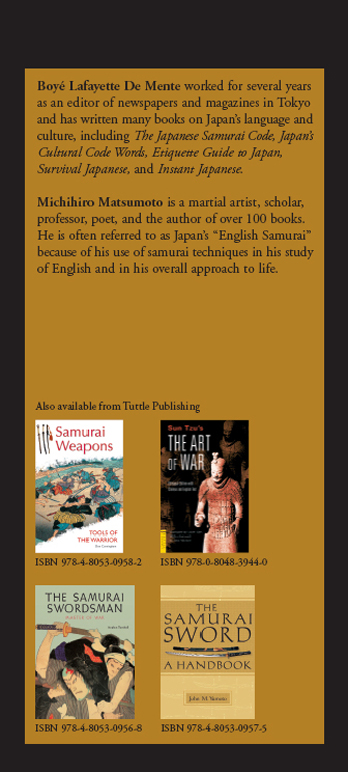
CHAPTER ONE
Set Goals
The goal of this chapter is to emphasize the importance of staying focused and maximizing your effort to get what you really want. The example set by Musashi in his training before he reached his thirteenth birthdayis one of the most remarkable stories in the history of Japans famed samurai class.
It is an example that should be emulated in todays world, but regrettably that is not the case, particularly in Japan. Young Japanese today are now poorly focused and desperately in need of a national identity. It is time we learned from Musashi and this book.
Michihiro Matsumoto
In his Book of Five Rings Miyamoto Musashi makes two obvious points about goals: First, you must choose a goal before you can achieve it, and second, the more difficult and dangerous your goal is, the more effort you must put into achieving it.
Musashis goal, which he established well before he reached his teens, was to become the best swordsman in his world. This would have been an ambitious goal at any time, but it was especially so in a world where swordsmanship was a matter of life and death for the class that ruled the country.
Musashi set out to be the best in a world that was already populated by many champion swordfighters who were obviously accomplished in the martial arts demonstrated by the fact that they were still alive!
There are few, if any, goals in modern life that compare with the ones Musashi set for himself. But all achievement starts with goals, and Musashi emphasized that you should be ambitious in setting them. Ambitious goals will help you focus your energies, abilities, and actions to maximum effect.
CHAPTER TEN
Learn from Your Opponents
There is no evidence that Musashi based any of his fighting techniques on the way a praying mantis stalks and attacks its victims, but in this chapter Boy attributes to Musashi all of the techniques and skills used by this extraordinary insectacute observation, quick adaptation, camouflage, and then an attack that is so swift it is virtually invisible to the intended victim. Both Musashi and preying mantids (pun intended) learned from their opponents. The message in this chapter is that achieving something great, such as surviving a death duel, you must be willing to risk all.
Michihiro Matsumoto
Musashi developed an incredible ability to really perceive the things he looked atnot just physical objects, but movements and patterns, like those of the sun, animals, birds, water, and people. He studied these until their essenceincluding how they manifested themselvesbecame clear to him. He then incorporated what he had learned into his approach to fighting.
In Musashis descriptions of his encounters, he explains in detail the weaknesses of his opponents and what he learned from them. His remarkable powers of observation made it possible for him to detect the fighting style of his opponents in a matter of seconds and absorb anything from their style that he considered worthwhile. He could then adjust his own style to overwhelm them, usually in a matter of seconds.
It was apparently this ability to observe, learn, and adapt nearly instantly that made it possible for Musashi to become an unbeatable swordsman without having a tutor.
The obvious lesson here: Study your opponents and competitors carefully. Know their strengths and their weaknesses precisely. Learn from them, adapt your approach to take advantage of their weaknesses, and then defeat them before they realize that you have changed your tactics.
CHAPTER ELEVEN
Pay Attention to Details
In this chapter Boy focuses on the role that details played in Musashis incredible success as a duelist. It is often said that the devil is in the details, but it is common for people to gloss over the smaller details, especially when big projects or major programs are concerned.
Musashi developed a kind of 4-dimensional skill in evaluating an opponent, the lay of the land, the weather, the time of day and more, in his fights to the death. As he noted numerous times big things will naturally be taken care of...it is almost always the small things that trip people up and bring on failure. In his case, failure to take details into account could have meant immediate death.

